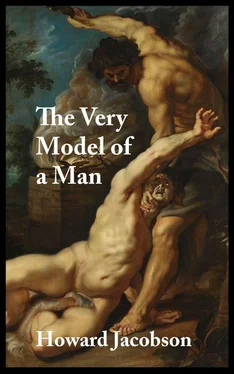‘This is poetry?’
‘This is satire. The highest and most healthful form of play. I blow away malign influences. I curse out demons. I do what you should be doing.’
‘I’m not a satirist,’ Cain says.
Preplen looks at him. And withdraws the light from both their faces. ‘No, you’re not, are you,’ he says. ‘Too much like your father, I suppose. Not enough of your mother in you.’
It is late when he gets back to his room. Already he can smell the morning on the night. He pushes open his door and resolves not to light a candle. There is nothing he needs to see. He slips out of his clothes, hanging them carefully, sleeves always out, pockets always emptied, and gropes towards the bed. His hands touch hair and flesh. He flinches from the contact, fearing that a stray dog may have crept under his blanket, or a stray prophet, or a stray relative from Eden. But what he touches next tells him that this is neither a scryer nor a satirist lying on its back on his bed, with its lips parted and its breath held and its small breast heaving.
‘Zilpah?’
The lean, abrasive arms reach up to clasp him. Once again his first thought is that she is too thin.
Girls without flesh are a delicacy in Babel. Like quail, they are valued because they can be consumed in a single mouthful. But Cain lacks the epicurean’s lightness of temperament. He is grave and seeks gravity. A slight woman confirms all his worst fears about existence. A slight woman proves the nugatoriness of things. A slight woman proves there is no hereafter. When you penetrate her you enter nothing.
She hangs from his neck, as weightless as a locket. With her mouth she seeks the lines and furrows of his suffering. She must taste every crime he has committed and every punishment that’s been visited on him. Of her own free will she must drink of the waters of bitterness. His bitterness.
He unlocks her fingers from behind his head.
‘What do you need?’ she asks him. She has a little voice, such as a mouse might have, to match her little body. But in a low register, as though the mouse behind the draughty wainscot has caught a little cold.
He shakes his head, vainly, in the dark. What does he need? Would she know what he meant if he said he needed scraping?
There is silence in the bed for a while. Nothing moves. He wonders if she has crept out without his hearing, nibbled through the mattress and escaped under the space beneath his door. Then suddenly the blanket is thrown off and she is up on all fours, whimpering like the stray dog he had at first taken her for.
‘This is what you need…’ the cur within her cries.
She presents her narrow, shadowed hindquarters to him, spreading herself open so that he may have complete and unobstructed access to the little puckered flower that grows in the very eye of her rump –
— What he needs.
The odour of her offering, her floral tribute, is rich and sour, suggestive of what is arable; its recipient at the mercy of just such impulses as must have riven his father in the days prior to Eve, when only a field of bullocks stood between all he knew of frustration and all he imagined of felicity.
He sighs, his father’s son. Old Adam’s boy. A vexed sigh. A sigh of this and that.
Then he takes hold of the fanatic plait.
‘This is what you need isn’t it…’ she growls, reaching between her thighs to make herself more available to him yet, a skinny hand on each furred and skinny hemisphere, ‘. . a brother.’
Farshtinkener, farfoylt, farshimmelt.
Cain has the sensations, whether or not he has the Yiddish. But he still doesn’t let go of the plait.
9. Cain Loses Himself in Pathos
He grew into a beautiful boy.
Does that sound like the language a connoisseur of catamites might use? A beautiful boy? It is meant to. His beauty was of that sort. Golden. Fragile. Petulant. Pliable. Fleeting. Cruel. Had Yahweh been a God given to enjoying good wine, He would not have needed to look beyond Abel for his cup-bearer. But Yahweh did not drink. Had we been more populous and there been older men, other than his father and his brother, to gaze upon him, they would have trembled for their chastity. His beauty was of that sort. You saw him once and you wanted to sail away with him to some enchanted surf-fringed isle, just the two of you, free of all distractions, so that you might torment yourself exclusively with the impermanence of love and loyalty and flesh.
His eyes were a pale wandering blue. His lips were full and moist, not quite together, not quite resolute, not quite a pair. His neck was long and luminous, a milky chrysaline white, the colour and transparency of pupae. You could see the blood pumping below his skin. His hair hung in yellow hoops that turned half-circles on his shoulders when he ran. He ran like a fawn in the afternoon. None of it could last.
Such precious perishability is wasted on mere family. You wonder why your brother doesn’t have a healthier appetite, why he is looking quite so translucent, then you go about your business. You have to be a perfect stranger to appreciate it perfectly. It was Abel’s bad luck to have been born before there were strangers.
We all suffered to some degree from this misfortune. Each one of us secretly imagined foreigners, impartial witnesses, angels on no particular errand — unrelated company to whom we could show off what we took to be our qualities, or express what we knew to be our grievances.
The gift of pleasing lay rotting in my father’s heart. For want of guests his instinct for hospitality turned inward, and every night he welcomed new terrors into his dreams.
Unconfided vexation massed like gallstones in my mother’s gut.
I…
But leave me out of it. This hour is consecrated to my brother. And our self-sufficiency, our entirety unto ourselves, was crueller to him than to any of us. For what good is a genius for unattainability when there is nobody out there to try attaining you?
In the absence of a god who hankered after boyish company, or older men who would cradle youth only that they might see it spill from their embraces like golden sand, Abel’s beauty found the adoration it couldn’t do without — in my mother. She fed on it, drank from it, following it everywhere with her eyes, repairing every accidental bruising to it with slow suppliant idolatrous fingers. She sat him on her lap. She pressed his head between her breasts. She blew on his neck and shoulders, to cool him when he was hot, to warm him when he was cold — a climatic system all his own. She stroked his chest. She kissed his navel.
Nothing maternally untoward in that? Then let me tell you she was still bathing him when he was eighteen, and would have been drying him when he was twenty…
There had been no pacifying Eve. Her anger was fed from invisible sources, was nourished by a root system so complex that had Adam hacked at it for a thousand years he would have diminished her supply not a trickle.
From the moment he saw that the bitter waters had left his wife’s belly flat and thigh intact, but had begun to seep instead into her affections, my father threw himself into a frenzy of expiation. Elaborate apologies were not his way. You could say he was without grace. Without, too, any of that capacity for transferred anguish which later men, men not muddy in their origins, would employ as a means of righting wrong: ‘You think you are hurt by what I’ve done? Look at how it has affected me!’ He was unsubtle, in other words, and sought to make amends the only way he knew how — manually.
He hewed for her. He drew for her. He chopped and axed and chipped and carved and sliced and scythed and smoothed for her. He bevelled bowls for her. Whittled ladles. Cut down palms to shape her bowers, bound lianas to make her hammocks, bent bamboo and plaited rushes so that she should have simultaneous shade against the sun and shelter from the cold.
Читать дальше











